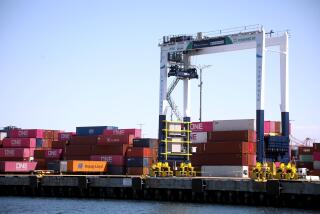Fuel Cells Could Be Key to Future Autos
The buzzwords in futuristic automotive circles these days are âfuel cells.â
These nifty little power plants, which gained fame during the Gemini spacecraft years because of their ability to convert hydrogen into electricity, are finally being seriously considered as a nonpolluting alternative to internal combustion machines--a step beyond electric cars powered by heavy, troublesome batteries.
At the annual Detroit auto show earlier this month, both Chrysler and General Motors officials spoke warmly of their fuel cell programs. Mercedes-Benz and Toyota have both already produced fuel cell prototype vehicles, perhaps a glimpse of the automobileâs future well into the next century.
But all of these programs have to deal with a major problem--the hydrogen.
Itâs volatile (remember the Hindenburg) and presents major delivery headaches--the corner service station isnât exactly set up for a hydrogen gas fill-up.
But while industry giants are struggling with the hydrogen quandary, a small group of scientists has been dealing with it by simply throwing it out. Next week, a group of seven researchers working on a project overseen by the Jet Propulsion Laboratory in Pasadena is scheduled to be issued a patent for a fuel cell that works without hydrogen.
It instead uses methanol, a liquid alcohol fuel derived from corn.
*
âWe looked at it a little differently than most people in the field,â said Gerald Halpert, a JPL program manager. âWe didnât settle on hydrogen. We started to play around with other fuels.â
The JPL scientists have built a model that can produce 50 watts of electricity, and they have plans for one that produces five kilowatts--enough to power the golf cart-like vehicles often used by parking enforcement officers.
Until this recent development, scientists had good reasons to stick with hydrogen. âHydrogen is seen as the Holy Grail,â said Shimshon Gottesfeld, team leader of a fuel cell project at Los Alamos National Laboratory.
Chief among hydrogenâs attractions is that it produces no noxious gases as byproducts when used to produce electricity. Hydrogen fuel cells work by forcing the element to give up an electron, which contributes to an electric current. What remains of the atom is then combined with oxygen to create water.
âItâs very clean,â Gottesfeld said.
As for the safety question, several scientists pointed out that although hydrogen has a terrible reputation, many fuels in common use can also be dangerous.
The future for hydrogen fuel cells is especially bright for home and business use. âThe infrastructure is already in place,â said Steve Visco, a principal investigator at the Lawrence Berkeley Laboratory.
âThe delivery for natural gas goes to a large majority of homes. That same system could deliver hydrogen gas.â
No such infrastructure exists for car fuel delivery of a pressurized gas, nor is there space for on-board storage. âIn a bus you might have room for pressurized tanks, but in a car it could be difficult,â Visco said.
Scientists are testing several possible solutions. Many include putting a small hydrogen factory aboard the car.
This device would convert liquid fuel, such as methanol or even conventional gasoline, into hydrogen gas that would be fed to the fuel cell. But the added step could cause a bit of pollution. And the use of gasoline (Chryslerâs solution) has been criticized as causing the usual environmental and political problems associated with drilling for oil.
*
The direct use of methanol is potentially a far more elegant answer. When a molecule of the stuff hits the fuel cellâs electrode in the JPL model, it releases six electrons that can be used for electricity.
This doesnât mean itâs six times more efficient. Methanol weighs considerably more than hydrogen gas. âBut in a car, you are not so much worried about weight,â Halpert said. âThe real question is, how much power can you get out of a tank full of fuel? For that, methanol does well.â
Still, many problems must be overcome--including dealing with impurities that reduce the efficiency of electrodes--before weâll all hit the freeways with fuel cell cars. And much more power than has been produced so far will be needed. A contemporary-size car would need a stack of fuel cells able to produce at least 40 kilowatts.
Still, a fuel cell that does not use hydrogen is a milestone.
âMaybe now,â said Gottesfeld, âthere are two Holy Grails.â







